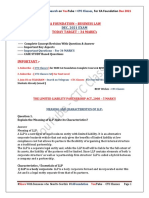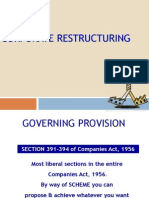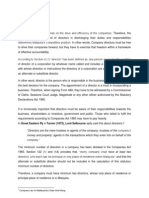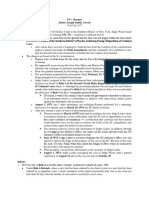Director Duties
Director Duties
Uploaded by
hannahxxxCopyright:
Available Formats
Director Duties
Director Duties
Uploaded by
hannahxxxOriginal Description:
Original Title
Copyright
Available Formats
Share this document
Did you find this document useful?
Is this content inappropriate?
Copyright:
Available Formats
Director Duties
Director Duties
Uploaded by
hannahxxxCopyright:
Available Formats
DIRECTORS DUTIES UNDER THE CORPORATIONS ACT 2001
Prepared by: redchip lawyers Level 1 The Portal 1 Breakfast Creek Road NEWSTEAD QLD 4006 Ph: (07) 3852 5055 Fax: (07) 3852 2559 E-mail: redchip@redchip.com.au Solicitors for:Australian Company Incorporation Services Pty. Ltd. Level 1 The Portal 1 Breakfast Creek Road NEWSTEAD QLD 4006 Freecall: 1800 773 477 Freefax: 1800 655 556 E-mail: acis@acis.net.au
DIRECTORS DUTIES UNDER THE CORPORATIONS ACT 2001 (CTH)
APPOINTING DIRECTORS.................................................................................................... 2 BUSINESS JUDGEMENT RULE ........................................................................................... 3 THE BUSINESS JUDGEMENT RULE IN DETAIL .......................................................................... 3 GENERAL DUTIES ................................................................................................................ 4 FIDUCIARY DUTIES .............................................................................................................. 4 TO WHOM ARE THE DUTIES OWED? ....................................................................................... 5 THE CONFLICT RULE ............................................................................................................. 5 INTEREST ............................................................................................................................. 7 MISAPPROPRIATION .............................................................................................................. 8 PROFIT ................................................................................................................................. 8 PROPER USE OF INFORMATION ............................................................................................. 9 PART 7.11 DIVISION 2A - INSIDER TRADING ........................................................................... 9 CIVIL REMEDIES.................................................................................................................. 10 MULTIPLE DIRECTORSHIPS AND COMPETING COMPANIES..................................................... 10 SHADOW DIRECTORS .......................................................................................................... 10 DIRECTORS IN CORPORATE GROUPS .................................................................................. 10 FURTHER OBLIGATIONS ................................................................................................... 11 THE STATUTORY DERIVATIVE ACTION ................................................................................. 12 CONCLUSION ...................................................................................................................... 13
DIRECTORS DUTIES UNDER THE CORPORATIONS ACT 2001 (CTH)
Becoming a director of a company carries with it certain responsibilities and duties. These are contained in the Corporations Act, which governs the management and operation of companies. You are under an obligation to understand your duties and responsibilities as a director of a company. Ignorant, careless and dishonest company directors have lost their savings, their reputations and gone to prison because they did not meet the standards the law imposes. A successful director is competent in his or her role as a director. Competency will only come through an understanding of these duties. A good knowledge of directors' responsibilities to the company and its members can potentially prevent you from being personally liable for failure to carry out these duties. This overview is by no means a full coverage of a directors duties. The Corporations Act is complex and you should seek professional legal advice if the need arises. APPOINTING DIRECTORS Requirements for Directorship. Any person may be a company director except: (i) (ii) (iii) (iv) A person who is not yet 18 years old (s201B(1)); Entities such as corporations; Undischarged bankrupts (s206B(3); A person who is more than 72 years old who cannot be a director of a public company. This rule can be overcome provided the company in a general meeting renews that director's appointment by passing a special resolution to that effect each year by general meeting (s201C); A person who has been, in the period of five years prior to becoming a director, convicted or released from prison for offences related to the promotion, formation or running of a company, including: (a) (b) (c) (d) (e) (f) failure to carry out obligations imposed by the insolvency procedures of a company; issuing a company prospectus which contains a false or misleading statement or material omissions; serious fraud; failing to carry out directors' duties in relation to a previous company; altering books and records concerning the management, capital and finances of a company; publishing misleading information concerning takeover bids, company securities or raising capital; and
(v)
(vi)
A person who is prohibited by the court or by an order of the Australian Securities and Investment Commission from managing a company.
Numbers of Directors. Proprietary (or private) companies require a minimum of one director and one shareholder. These companies are often termed sole director companies. A proprietary company does not need a secretary if there is only one director. The need for a company secretary in sole director companies has been recognised as superfluous and accordingly, the law has been changed. A public company must have at least three (3) directors at least two (2) of which must ordinarily reside in Australia. Proprietary companies require at least one (1) Australian resident director. Common Seals. As companies are no longer required to have or use common seals, the Corporations Act allows third parties to assume that a document has been duly executed under hand if executed by: two directors of the company; a director and secretary of the company; or if the company is a proprietary company, a sole director.
This assumption may be made by any person who is unaware of a particular companys requirements for due execution of a document. Forming Companies. Whether an executive director or not, all directors will have the same duties and obligations under the Law. BUSINESS JUDGEMENT RULE The business judgement rule is an overriding safe harbour to protect directors from personal liability for breaches of duty owed to the company and to shareholders. The rule means that where the director makes honest, informed and rational business judgements on behalf of the Company, that director should be able to avoid any personal liability arising from that judgement. In the past, the Courts have been reluctant to review the judgements of directors exercised in good faith. They have also on occasion refused to exercise discretion to excuse directors from liability where they have acted fairly and honestly. This has resulted in uncertainty in the minds of directors as to the extent of due diligence required of them prior to entering into a transaction on behalf of the Company. The fundamental purpose of the business judgement rule is to protect the authority of directors in the exercise of their duties, not to insulate directors from liability. The Business Judgement Rule in Detail An officer of a corporation will be deemed to have met the requirements of subsection 180(2) and the general law duty of care and diligence in respect of a business judgement made by them, if the officer:
exercises their business judgement in good faith for a proper purpose;
does not have a material personal interest in the subject matter of the business judgement; informs themselves about the subject matter of the business judgement to the extent the officer reasonably believes to be appropriate; and rationally believes that the business judgement is in the best interests of the corporation.
This means that where a business decision or judgement has been made by an officer satisfying section 180(2) requirements, then the decision is not reviewable by the Court. GENERAL DUTIES Duties often fall into the following categories:
A duty to act bona fide in the interests of the company as a whole; To exercise one's powers as a director for the purpose for which they were conferred and not for any ancillary or improper purpose; Not to restrict the future exercise of a director's powers; and To avoid being placed in a position of a conflict of interest.
The question to ask is whether a directors actions are a contravention of a directors' duties. This depends upon whether those actions are authorised by:
the companys constitution; the company members in general meeting; or the board of directors.
FIDUCIARY DUTIES Directors are also subject to fiduciary duties. The fiduciary duties of company officers are:
that they must not improperly use their position to: (a) (b) gain an advantage for themselves or someone else; cause detriment to the corporation;
that they must not use information which they obtained because of their position to gain advantage for themselves or cause detriment to the corporation. that they must exercise their powers in good faith in the best interests of the corporation and for a proper purpose; and that they must notify other officers of a material personal interest if and when a conflict arises. A material personal interest is a matter that relates to the affairs of the company. The notice may be given at any time even if at the time there was no existing conflict.
The standard of care required to be exercised by directors has been clearly set out by the Corporations Act 2001 (Cth). A director of a company is required to exercise their powers and discharge their duties with the degree of care and diligence that a reasonable person would exercise if they: (i) (ii) (iii) were a director of a corporation in the corporations circumstances; occupied the same office as the director; and had the directors experience powers and duties.
This recognises the role played by directors in managing the company's daily affairs. If a director breaches any of these duties then civil penalties will apply. However, if a director recklessly or intentionally breaches any of these duties then an offence is committed. Similarly, if a person obtains information and uses it dishonestly with an intent to gain advantage, then an offence will be committed. To whom are the Duties owed? Company officers will be liable to the company for the profit gained from a breach of their fiduciary duties. These duties are created when:
The directors indicate a willingness to act as a shareholder's agent in negotiations; In the case of a family company, family directors who give recommendations or advice regarding shares to family shareholders, will create a fiduciary relationship between themselves and the shareholders because of that advice; or A director acts in the joint interests of the shareholders and the company.
A director's fiduciary duties generally stop when he or she ceases to be a director, however, certain statutory duties may well continue even though the person has ceased to be a director. The executive and non-executive directors, the secretary and other company officers have these fiduciary duties. The Conflict Rule A director must not let his/her personal interests and company duties conflict. This is a fundamental rule of equity (Phipps -v- Boardman (1967) 2 AC 123). A director may well ask:
Does the possibility of conflict have to be more than a real prospect? Can a director enter into an arrangement knowing that they may have a real chance of conflicting with the interests of the company? Is there a conflict where a director holds shares in another company with which the original company transacts?
Section 191(1) states that a director has a duty to notify other directors where he/she has a material personal interest in a particular conflict. There are exemptions from the general obligation to disclose. A director does not need to disclose his or her interests if the interest: (i) (ii) (iii) (iv) (v) (vi) (vii) (viii) (ix) arises because of the director's membership of the company and is held in common with the other members; arises in relation to the director's remuneration; relates to a contract which is subject to the members approval and no obligation will be imposed on the company if the members do not approve it; arises merely because the director is a guarantor; relates to an insurance contract indemnifying the director; relates to a payment under a contract of indemnity which is permitted by the company in favour of the director; arises because the director is a director of a related body corporate which proposes to enter into a contract with the company; the company is a proprietary company and the other directors are aware of the director's interest and insulation to the affairs of the company; or the following conditions are satisfied: (a) the director has given notice to the company and how the interest relates to the affairs of the company; (b) the nature or extent of the interest has not materially increased above that disclosed in the notice; and (c) any new directors appointed after the notice is given are also given notice of the interest at the time of their appointment; (x) The director has given a standing notice to the company of the interest.
In every other case where a director has a personal interest in the transaction, it must be declared at a meeting of directors. A notice given to the board declaring a director's interest must give details of: (i) (ii) the nature and extent of the interest; and the relation of the interest to the affairs of the company,
and be given at a director's meeting as soon as practicable after the director becomes aware of the interest.
Standing Notice A director of a company who has a personal interest in a matter may give the other directors standing notice of his or her extent or nature of the interest in the matter. The notice may be
given at any time and relate to any affairs of the company. It need not be given when the actual conflict has arisen. The notice must give details of the nature and extent of the interest and be given at either a director's meeting or to other directors individually in writing. A standing notice ceases to have effect where the nature or extent of the interest has materially increased above that disclosed in the notice. A general notice to the board of the interest may be sufficient declaration in relation to the transaction. Non-compliance with the Corporations Act will not invalidate the transaction. However, if the companys Constitution requires the boards discretion to approve such a transaction, and the disclosure is not made and consent is not obtained, then the company will have the option to declare the transaction null and void. Material or Personal Interest Section 195(1) states that a director of a public company, who has a material or personal interest in a matter that is being discussed at a meeting of directors, must not vote on any resolution in respect of the matter and must not be present whilst the matter is being considered by the meeting. However, under Section 195(2) the other directors who do not have material or personal interest may pass a resolution that states that those directors are satisfied that the relevant director's interest should not disqualify him or her from voting or being present. Similarly, Section 195(3) allows the ASIC at its discretion to declare in writing that the director may be present and vote. Interest If a director's personal interest is substantially affected by the outcome of a boards decision, it must clearly be disclosed. Whether or not disclosure has to be made is more difficult where the impact on a director's position is slight, or where the outcome of the deliberation might or might not affect the director's position depending on other circumstances. Such interest does not have to be financial and can exist where a relative of a director stands to benefit rather than the director personally. If the interest is held as a company member and is common with other members, then it is not a personal one, but an interest under an executive employee share option scheme will require disclosure. Compliance with Section 195(1) will not relieve a director from the obligation to comply with the Law. Not only will a director be required to disclose an interest, but also a director will be legally prevented from exploiting the opportunity without shareholder approval, even if the board allows the director to participate in any resolution on the matter.
Misappropriation A director may not apply company property either for the director's personal benefit or for the benefit of any other person without the authority of the company. Directors must not take remuneration or other benefits out of the companys resources unless:
authorised by law; authorised by the companys constitution; or with the fully informed consent of the company in a general meeting.
Misappropriation applies where a director takes an identifiable asset, including confidential company information of the company, without the company's authority. Confidential information disclosed to a company director imposes a duty on the director to preserve the confidential nature of the information and the company/confider may take proceedings to restrain a breach, where:
the information is of a confidential nature in the sense that it is not something which is public knowledge; and it has been communicated in circumstances giving rise to an obligation of confidence.
Profit The profit rule states that a director is accountable for the profits made in connection with their office. The duty is not disposed of by showing that the transaction was fair to the company, or that the director was eventually unable to exploit the opportunity to make a personal profit. The courts are still deciding as to whether or not a director is accountable if the company is unable to pursue the profit making opportunity:
to allow a director to exploit for his/her own benefit opportunities arising whilst a director; to allow a director to establish by way of a defence that the transaction is fair to the company; and to permit a director to put an end to fiduciary responsibility by resigning from the company.
Directors are not absolutely prohibited from acting for their own benefit in the same kind of business carried on by the company, but they are accountable if they divert business opportunities away from the company and into their own interests (which the company itself is either actively pursuing or had the opportunity to pursue and might reasonably be expected to be interested in, given the company's line of business). As to whether a director would still be in breach of a fiduciary duty if the company could not take up the opportunity depends on whether the obstacle to the company taking up the opportunity is one which the directors themselves could remove. If this is the case, then the
director is prevented from taking up the opportunity personally, but if the company couldnt do anything about removing the obstruction in the circumstances, then the director may be allowed to do so. Even where a director resigns to exploit an opportunity, he or she can still be in breach of their fiduciary duty by the mere fact of the exploitation. A company cannot stop a director from exploiting an opportunity if the company has terminated the director's position. Proper Use of Information Section 183 provides that an officer, including a director or employee or a former officer or employee, must not make improper use of information acquired by virtue of that position. This applies to any officer or employee, including junior employees and arises if any advantage is gained for themselves or any other person. The provision only applies where improper use is made of information or position, despite the fact the director may have acted honestly. However, if it is determined that the information was used dishonestly with the intention of gaining an advantage then the action will amount to a criminal offence. Part 7.11 Division 2A - Insider Trading These provisions outline the elements of insider trading offences, namely:
Territorial in connection ie. whether the conduct occurred in Australia; Dealing in securities (shares and options); Information (includes matters of supposition and intentions and likely intentions of a person); Possession of information that is not generally available and that has a material effect on the price of securities (one knows or ought reasonably to know that the information is not generally available, and if it were it might have a material effect on the price of value or securities).
A company can allow a director to receive a personal benefit from some transactions involving the company. This can be set out in either the companys constitution or in a general meeting of the company where:
the members authorise a director to receive a personal benefit in a transaction in what otherwise would be a breach of duty; or action was undertaken by a director to pursue his or her own interests and is approved by the members in a meeting, despite the transaction being completed.
The consent of disinterested directors will not serve to remove the companys right to complain of a breach of duty on the part of an interested director. Each director must give an unqualified opinion as to whether the company should approve an interested director's breach of duty.
10
Civil Remedies
Rescission: The transaction is avoidable at the election of the company. Profits: Any profit may be accountable to the company regardless of whether the company suffered any loss. Equitable Compensation: Where a breach causes actual loss to the company, monetary compensation may be ordered. Constructive Trust: Where a breach removes an item of the companys property and the director retains an asset representing that item, the company has a proprietary claim to that asset and the director will be deemed a constructive trustee over that asset on the companys behalf.
Multiple Directorships and Competing Companies It is not a breach of fiduciary duty for a person to be a director of two (or more) companies that are competing against each other, so long as confidential information is not divulged by the director between any of them. There is a wide distinction between asking a director to account for the profit made out of a breach of his fiduciary relationship and asking a director not to join the board of a competing organisation in case he should at some future time decide to act in breach of his fiduciary duty. The proposition that a person can act as a director of two competing companies without breaching fiduciary duty is subject to the following qualifications:
The contract of employment of an executive officer may be subject to an express/implied term that the employee must provide his services exclusively for the employer; It is a breach of duty for a director to ask the companys customers to cease to deal with the first company and to deal with the second company; and A director may be restrained from using information (which would be a breach of duty by an employee not to disclose) during the course of his or her employment and must not divulge information from one company to the other company, or use information for the benefit of a rival company.
Shadow Directors A person who has not been appointed to the board, but is a director because the appointed directors follow that persons instructions, is called a shadow director. A shadow director could be liable for a breach of the statutory duties if he or she is able to issue instructions to the board. Shadow directors could be in breach of fiduciary duty if they fail to avoid conflicts between interest and duty. If a substantial personal stake in the appointor is held a shadow's first duty will be to the company. Directors in Corporate Groups Generally, directors must exercise their powers for the benefit of the company they direct and not for the benefit of other companies in the group. However, a director of a wholly
11
owned subsidiary may take into account the interest of a holding company and be considered to act in good faith in the best interest of the subsidiary if: (a) (b) (c) the constitution of the subsidiary expressly authorises the director to act in the best interests of the holding company; the director acts in good faith in the best interest of the holding company; the subsidiary is not insolvent at the time the director acts and does not become insolvent because of the director's act.
On this basis, directors will not be in breach of their fiduciary duties to the subsidiary company where a transaction that benefits the group as a whole (or another company within the group) can also be regarded as benefiting the subsidiary company. These benefits may be of a derivative rather than direct nature. The test to be applied is whether an intelligent and honest person in the position of a director of the company could have reasonably believed that the transaction was for the benefit of the subsidiary company. FURTHER OBLIGATIONS Maintenance of Accounts. Directors are obliged to monitor and keep books of accounts and financial records that truly reflect the financial state of the company's affairs, and to ensure that such information is furnished to ASIC for all companies annually, setting out details of all assets, profits and liabilities. At every annual general meeting for public companies, directors must present these records to the meeting and ensure that they incorporate profit and loss accounts, a balance sheet, an auditors report and a directors' report (which will be discussed later). Companies will be deregistered and/or penalised (along with their officers) if they fail to lodge their annual statement with ASIC. The Raising of Funds. When securities are issued, the directors must ensure that any prospectuses issued contain proper information and do not make false or misleading statements. If a statement turns out to be inaccurate, a director will need to show that it was based upon research and reasonable estimation at the time it was made. If the directors cannot demonstrate this, they are likely to incur personal liability for inaccurate statements. Fair Trading Acts and The Trade Practices Act. Directors may be liable personally under these Acts if they partake in action for the purposes of lessening competition between companies or are engaged in making false and misleading statements. Insolvency - Creditors and Members. Directors cannot make managerial decisions which render the company insolvent, or enter into transactions where they know the company is or will become insolvent and be unable to honour obligations. The directors have an obligation to protect the members and creditors from decisions contributing to insolvency. The directors may become personally liable to the creditors if they do not. Their duty relates to the principles of due diligence as previously discussed, which effectively require an active interest in the day-to-day running of the company and its solvency, if they are to avoid potential liability. It is the week-end, passive or shadow directors who realise, often too late, that ignorance of the company's affairs and the Law will not protect them from liability.
12
Other Statutory Duties. There are other duties required by the law that directors should be aware of, including:
Directors have a duty to ensure that dividends are paid from profits and not out of capital (Section 254T); An allotment of shares following a public offering is prohibited unless a minimum subscription is obtained (S1035); The prospectus that is issued must comply with the Corporations Act (S1021); When a requisition is presented under Section 249D, directors must call a meeting within 21 days after the request is given and not more than 2 months after receiving it; Directors must take all reasonable steps to see that proper accounting records are kept in compliance with Section 295 of the Law; Directors are bound to have accounts and accompanying reports made out and laid before the Company and to take reasonable steps to ascertain that the matters in the accounts are correct; and Directors may be liable if the company does not keep the various statutory registers.
Directors relationships with the Shareholders The duties which regulate directors' actions are to be viewed in the context of a director's relationship with shareholders. A director manages a company for and on behalf of the shareholders (the owners), such that any regulatory or legal requirement that restricts the actions of a director ultimately compromises their ability to maximize shareholder wealth. Similarly, it is the directors who influence the directions a company will take and the efficiency of company operations, so that any undue costs that are encountered by directors in protecting themselves from personal liability are ultimately passed onto and borne by the corporation itself. On the other hand, if directors are permitted to operate completely unfettered by regulation and a degree of shareholder control, investor confidence in the corporate vehicle may potentially be undermined. In this regard, it is clear from past experience, particularly in relation to the corporate collapses of the 1980's, that conduct of directors through corporations can have a significant impact on public perceptions and market confidence. To promote investor confidence and facilitate expansion of capital markets, investors need to be satisfied that they have sufficient opportunity for redress against a corporation and its directors in clear cases of negligent, reckless or fraudulent conduct. However, directors who effectively control the corporation, must not feel so over-burdened with a fear of responsibility that their decision-making is seriously constrained. The Statutory Derivative Action The statutory derivative action enables shareholders or directors of a company to bring an action on behalf of the company for a wrong done where the company is unwilling or unable to bring the action itself.
13
In the past, it has been extremely difficult for shareholders to bring any action against a director of a company, where that director has breached their duties owed to the company and the shareholders. Many barriers stood in the way, not the least of which is the cost involved, the legal process, especially where the actions of the director were ratified by the board. The statutory derivative action imposes a more effective avenue of enforcement of the companys rights than has previously been available. The statutory derivative action provides strong encouragement for company managers to be accountable to shareholders for the decisions that they make. For directors, the statutory derivative action is most important. It will relieve any uncertainty with regard to what constitutes a proper ratification of a directors actions. The proposal gives discretion to the court to take into account the ratification of a directors actions by the company. The court will not be bound by a company ratification of a directors actions in allowing a member to sue on behalf of the company (i.e. where a company has ratified the actions of a director, a court in reviewing an application can have regard to the ratification but is not bound to accept it). Furthermore, the statutory derivative action permits the court to allocate costs to the company, encouraging members to pursue breaches by directors. Directors should take this into consideration as it may serve to alleviate the burden of such costs incurred by the suing member. Previously, the substantial costs involved in bringing an action have often stopped the action before it could reach the court. It is important to remember that the business judgement rule has allowed for directors to escape personal liability for decisions made in good faith for the companys interest. In balancing this, the Corporations Act includes the statutory derivative action, which allows individual shareholders to bring actions against directors of the company for their breaches of duty. Barriers such as cost and board ratification, no longer exist, ensuring the statutory derivative action is an effective means by which shareholders can be assured of directors' best endeavours. CONCLUSION In summary, directors should carefully study, understand and appreciate the responsibilities that they are subject to as company directors. Additionally, directors should take an active interest in following the changes to the Law when they are implemented and the implications of those changes for the company and, more particularly, for the directors as they affect their directorship roles. Directors should also remember the impact of the law in relation to the following: (a) Auditors: required to answer questions at shareholder meetings, but possibly under no obligation to attend or to provide answers under professional privilege; there is a positive obligation on company officers to assist auditors finalising the company audits.
14
(b)
Directors, Secretaries and Shareholders: meeting and reporting requirements; use of communications for directors and shareholder meetings; standard 21 days notice for members' meeting; onus upon directors' disclosure in company reports; abolition of par value authorised capital; replaceable rules and its interaction with the company constitution.
To observe one's directorship duties, and in order to minimize liability, a director should:
actively partake in the day-to-day running of the company; become aware of the behavior and nuances of your fellow directors and the company members, particularly majority shareholders. Get an appreciation of how they conduct business, their reaction-time on requirements under the Law, and their attitude to the proper observance of their duties.
This knowledge will enable you to anticipate any potential problems from which questions of director liability may arise and, hopefully, avoid unwarranted liability falling on your shoulders. You may want to consider taking out insurance to cover the event of non-observance of duties which leads to damages or allegations of negligence. You should always ensure that, if your position on a matter was different to that of the other directors, that your point of view is either:
Accurately recorded, whether it be in meeting minutes, letters or other memoranda. Ensure a copy is filed with the company records and keep a copy yourself; and/or In a situation where you suspect that a decision was or will be made by the directors in breach of their duties, you should make arrangements for it to be put before the members to be ratified by them, provided that it is not an actual breach of the Law or a criminal act.
The observance and responsibility of your duties as a director lies on your shoulders. A full understanding and regular observance of one's duties will make your appointment as a director a happy and productive one.
WARNING This paper is intended as an informative overview only, and is not intended as legal advice. For questions arising out of this paper, please contact Mr. Gavin Barnes. Copyright in this is claimed to redchip lawyers and no part of it can reproduced in any way contemplated by the provisions of the Copyright Act 1968 (Cth) without the express written authorisation of redchip lawyers. IMPORTANT NOTE: We do not provide legal, accounting, taxation or investment advice or advice regarding stamp duty or other state or territory taxes nor in respect of any other matter. Since taxation laws, the Corporations Act, trust laws and stamp duty laws in all jurisdictions are continually changing, advice should be obtained from qualified and licensed professionals before signing any documents. Significant fees, duties and penalties may be imposed when dealing with company shares. Accordingly we disclaim all liability for anything done or omitted to be done in respect of any company matters.
You might also like
- Holder, Staton, Sutherland Springs CaseDocument12 pagesHolder, Staton, Sutherland Springs CaseRebecca SalinasNo ratings yet
- Entrance Examination For STEM MathematicsDocument2 pagesEntrance Examination For STEM MathematicsEmelyn V. Cudapas89% (9)
- Failures of Corporate GovernanceDocument9 pagesFailures of Corporate Governancek gowtham kumar100% (2)
- Soul Development Through Handwriting SampleDocument19 pagesSoul Development Through Handwriting Samplemiramendoza100% (6)
- ANA Sales Training FrameworkDocument1 pageANA Sales Training FrameworkDemand Metric100% (2)
- Duty of DirectorDocument10 pagesDuty of DirectorRenee WongNo ratings yet
- 09 Directors - Company Secretary and AuditorsDocument10 pages09 Directors - Company Secretary and AuditorsKevin KausiyoNo ratings yet
- Corporate VeilDocument68 pagesCorporate VeilShahmeer BalochNo ratings yet
- Directors Fiduciary Duty To A Company (India)Document19 pagesDirectors Fiduciary Duty To A Company (India)AKHIL H KRISHNANNo ratings yet
- Company LawDocument69 pagesCompany LawAli Sibtain NaqviNo ratings yet
- Corporate GovernanceDocument7 pagesCorporate GovernancePraveen CaesarNo ratings yet
- Object Clause of MOADocument19 pagesObject Clause of MOAHarsimran SinghNo ratings yet
- The Companies (Amendment) Act 2015Document29 pagesThe Companies (Amendment) Act 2015Vikram PandyaNo ratings yet
- Memorandum of AssociationDocument6 pagesMemorandum of Associationshankha86100% (1)
- Companies Act, 2013 NotesDocument53 pagesCompanies Act, 2013 NotesJagmohan SainiNo ratings yet
- Company Law - ProjectDocument6 pagesCompany Law - ProjectSagar KhandelwalNo ratings yet
- Prospectus, Redd Herring, ShelfDocument7 pagesProspectus, Redd Herring, ShelfSANDEEP BANERJEENo ratings yet
- LAW Graduate Essay 2:1docxDocument5 pagesLAW Graduate Essay 2:1docxCarl MunnsNo ratings yet
- Corporate GovernanceDocument56 pagesCorporate GovernanceHimanshu Gupta100% (2)
- Shares & Share Capital FinalDocument37 pagesShares & Share Capital FinalRupal Bharat Bhansali100% (1)
- Lifting The Corporate VeilDocument6 pagesLifting The Corporate VeilChanda ZmNo ratings yet
- Ethics, CSR & Corporate BehaviorDocument50 pagesEthics, CSR & Corporate BehaviorSakshi Khurana100% (2)
- Legal Entity of A CompanyDocument5 pagesLegal Entity of A CompanyALiice Mei SanNo ratings yet
- External Sources of FinanceDocument18 pagesExternal Sources of FinanceMonika ThakurNo ratings yet
- Company LawDocument109 pagesCompany LawTom100% (1)
- Ethics As A Dimension of Social ResponsibilityDocument23 pagesEthics As A Dimension of Social ResponsibilityLily Dania100% (1)
- Corporate Governance and The Role of Institutional InvestorsDocument47 pagesCorporate Governance and The Role of Institutional InvestorsSaritaMeenaNo ratings yet
- Corporate Governance Issues in Mergers and AcquisitionsDocument12 pagesCorporate Governance Issues in Mergers and AcquisitionsSoumya KesharwaniNo ratings yet
- Practice Questions Company LawDocument8 pagesPractice Questions Company LawAditi SinghNo ratings yet
- Definition and FeaturesDocument4 pagesDefinition and FeaturesnayakNo ratings yet
- Start BusinessDocument3 pagesStart BusinessBayari E EricNo ratings yet
- Protection of Minority ShareholdersDocument17 pagesProtection of Minority ShareholdersTee Michelle100% (1)
- Duties of Directors Under Company LawDocument6 pagesDuties of Directors Under Company LawManasvi ThaparNo ratings yet
- Becg Unit 3Document43 pagesBecg Unit 3boosNo ratings yet
- Merger ProcessDocument21 pagesMerger ProcessDevika RaniNo ratings yet
- Walmart PESTELDocument5 pagesWalmart PESTELAmit JainNo ratings yet
- Company Law AssignDocument8 pagesCompany Law AssignSipho NdlovuNo ratings yet
- Padhy Leather - Team 6 - Case Study 2 Submission-2Document17 pagesPadhy Leather - Team 6 - Case Study 2 Submission-2ElvisNo ratings yet
- Business Law 34 Marks Revision - CTC ClassesDocument36 pagesBusiness Law 34 Marks Revision - CTC ClassesThe Real BNo ratings yet
- Corporate RestructuringDocument54 pagesCorporate RestructuringBabasab Patil (Karrisatte)100% (2)
- Ratio Analysis PDFDocument3 pagesRatio Analysis PDFABINASHNo ratings yet
- Company Law BMSDocument125 pagesCompany Law BMSShivraj BSCNo ratings yet
- Slide 3 Recommendation of Cadbury CommitteeDocument13 pagesSlide 3 Recommendation of Cadbury Committeecohen.herreraNo ratings yet
- Nature and Scope of Corporate FinanceDocument1 pageNature and Scope of Corporate FinanceSitaKumari100% (3)
- Corporate Governance Imp QuestionsDocument11 pagesCorporate Governance Imp Questionskomalc2026No ratings yet
- Corporate Governance and EtihcsDocument85 pagesCorporate Governance and EtihcsNeil GuptaNo ratings yet
- Section 248 of Companies Act, 2013 - Power of Registrar To Remove Name of Company From Register of CompaniesDocument6 pagesSection 248 of Companies Act, 2013 - Power of Registrar To Remove Name of Company From Register of Companiesmohammed ibrahim pashaNo ratings yet
- 2.1 Promoter and ConstitutionDocument25 pages2.1 Promoter and ConstitutionLim Yew TongNo ratings yet
- Chapter:-2: Memorandum of Association & Articles of AssociationDocument29 pagesChapter:-2: Memorandum of Association & Articles of AssociationRahul NikamNo ratings yet
- The Formation of A CompanyDocument17 pagesThe Formation of A Companyshakti ranjan mohantyNo ratings yet
- Business Ethics in IndiaDocument3 pagesBusiness Ethics in Indianikhu_shuklaNo ratings yet
- Unit 1Document29 pagesUnit 1Kuthubudeen T MNo ratings yet
- MERGERS AND ACQUISTIONS - NotesDocument60 pagesMERGERS AND ACQUISTIONS - NotesStevin GeorgeNo ratings yet
- Factors Determining Optimal Capital StructureDocument8 pagesFactors Determining Optimal Capital StructureArindam Mitra100% (8)
- Mergers & AcquisitionsDocument4 pagesMergers & AcquisitionsdikpalakNo ratings yet
- Steps For Formation of A CompanyDocument22 pagesSteps For Formation of A Companyrajiv gupta40783% (6)
- Cross Boader Merger & AcquisitionDocument9 pagesCross Boader Merger & AcquisitionsangeetagoeleNo ratings yet
- Emerging Trends in Corporate Governance PracticesDocument9 pagesEmerging Trends in Corporate Governance PracticesDr-Rahat KhanNo ratings yet
- Case Laws On Company LawDocument5 pagesCase Laws On Company LawPriyanka Dargad0% (1)
- Law Assignment IndividualDocument7 pagesLaw Assignment IndividualMohamad WafiyNo ratings yet
- Study Unit 10 Discussion Questions and AnswersDocument12 pagesStudy Unit 10 Discussion Questions and AnswersArap KimalaNo ratings yet
- Unit 10Document14 pagesUnit 10RonelleNo ratings yet
- Duty of DirectorDocument11 pagesDuty of DirectorNur Afiza TaliNo ratings yet
- CclawDocument8 pagesCclawleeyy123No ratings yet
- GCST5905 Identity, Place and CultureDocument9 pagesGCST5905 Identity, Place and CulturehannahxxxNo ratings yet
- Neoliberalism and InstrumentalismDocument17 pagesNeoliberalism and InstrumentalismhannahxxxNo ratings yet
- Lift Redfern - Where To Next - Some IdeasDocument1 pageLift Redfern - Where To Next - Some IdeashannahxxxNo ratings yet
- Law As StatisticsDocument19 pagesLaw As StatisticshannahxxxNo ratings yet
- Caluya Gay Scene of RacismDocument14 pagesCaluya Gay Scene of RacismKevin A. MandrillaNo ratings yet
- Chapter 6 and 7Document2 pagesChapter 6 and 7Iryn JoieNo ratings yet
- TR Barbering NC IIDocument73 pagesTR Barbering NC IIHervin Calabia0% (1)
- Betting Against BetaDocument82 pagesBetting Against BetaXad3rNo ratings yet
- Alcotest 7410 GLC: Operator ManualDocument15 pagesAlcotest 7410 GLC: Operator Manualrazvyy222No ratings yet
- AHW3e - Level 01 - Exit Test 1Document4 pagesAHW3e - Level 01 - Exit Test 1Alexandra MunchaNo ratings yet
- Benefits: Employees TPI-theoryDocument2 pagesBenefits: Employees TPI-theorylollaNo ratings yet
- Sakalakala Valli MalaiDocument6 pagesSakalakala Valli MalaiDurga Devi Muthusubramanian0% (1)
- 18.1 Quran at The Time of DespairDocument7 pages18.1 Quran at The Time of DespairProf M. SHAMIMNo ratings yet
- Product CatalogueDocument13 pagesProduct CatalogueAli Hassan TariqNo ratings yet
- Significance of The Title of The Play RhinocerosDocument4 pagesSignificance of The Title of The Play Rhinocerosrupal arora100% (4)
- Story of Prince Siddhartha GautamaDocument6 pagesStory of Prince Siddhartha GautamaAlone SkyNo ratings yet
- ComicsDocument7 pagesComicsMustafa Kahled NassarNo ratings yet
- Postoperative Pain Management IMADocument53 pagesPostoperative Pain Management IMAashok_jadonNo ratings yet
- Anglo-Us Model of Corporate GovernanceDocument2 pagesAnglo-Us Model of Corporate GovernanceLaw Classes Kolkata100% (1)
- Ingles GramaticalDocument8 pagesIngles GramaticalGreka D-oNo ratings yet
- A Study To Assess The Work Life Harmony of Employees at Aashman FoundationDocument56 pagesA Study To Assess The Work Life Harmony of Employees at Aashman FoundationKrishna GoelNo ratings yet
- B Unit - Model Test 04 - MCQ, Written SolutionDocument7 pagesB Unit - Model Test 04 - MCQ, Written SolutionT RdtfrNo ratings yet
- Resume Sanjit - Panda - 13 YearsDocument4 pagesResume Sanjit - Panda - 13 YearsParthasarathy PNo ratings yet
- Persamaan Serentak Dan MatrikDocument19 pagesPersamaan Serentak Dan Matrikseluang1No ratings yet
- Nature and Overview of Field MethodsDocument62 pagesNature and Overview of Field MethodsWenceslao, Mary Zhairyn Faith F.No ratings yet
- Technicalanalysis Astudyonselectedstocks 120105030453 Phpapp02Document76 pagesTechnicalanalysis Astudyonselectedstocks 120105030453 Phpapp02Ankita DoddamaniNo ratings yet
- Appendix 2 Colposcopy ManagementDocument2 pagesAppendix 2 Colposcopy ManagementFA KhanNo ratings yet
- Unit 1Document31 pagesUnit 1araz_1985No ratings yet
- (13144081 - Cybernetics and Information Technologies) Shadow Detection and Removal From A Single Image Using LAB Color SpaceDocument9 pages(13144081 - Cybernetics and Information Technologies) Shadow Detection and Removal From A Single Image Using LAB Color SpaceThar NgeNo ratings yet
- EXAM Chapter 14 HW, Practice Quiz, Quiz, ProblemsDocument15 pagesEXAM Chapter 14 HW, Practice Quiz, Quiz, Problemsj loNo ratings yet
- US v. Roemer Justice Joseph Smith, Circuit FactsDocument2 pagesUS v. Roemer Justice Joseph Smith, Circuit FactsTippy Dos SantosNo ratings yet






























































































